
AI Voice Agents Explained: The Ultimate Guide
Looking for our Text to Speech Reader?
Featured In
- What are AI Voice Agents?
- How to Use AI Voice Agents
- Benefits of AI Voice Agents
- AI Voice Agents Use Cases
- Customer Support Automation
- Virtual Assistants
- Automated Sales and Lead Generation
- Call Center Operations
- Automated Survey Collection
- Barbershop
- Dentist Office
- Restaurant
- Realtor Office
- Insurance Companies
- Lead Qualification
- Debt Collection
- Transportation & Logistics
- Healthcare
- Government
- Travel & Hospitality
- Insurance
- Legal
- Real Estate
- AI Voice Agent Implementation Steps
- Best AI Voice API for Building Custom AI Solutions
- Top AI Voice Agent Platforms
- Create Your Own AI Agents with Speechify TTS API
- FAQ
Uncover the power of AI voice agents with our ultimate guide.
AI voice agents are rapidly transforming industries by enabling seamless, automated voice interactions that mimic human conversations. As businesses look for ways to streamline processes and enhance customer engagement, the role of AI voice agents has grown significantly. This guide will cover everything you need to know about AI agents —from understanding what they are and how to use them, to exploring the best AI voice agent platforms, AI voice API, and use cases for your business.
What are AI Voice Agents?
Think of AI voice agents as having a super-efficient, always-on assistant who never takes a break. Imagine a friendly voice that answers your calls 24/7, handles customer questions, schedules appointments, and even qualifies leads—all without a single coffee break. This no-code, virtual sales superstar doesn’t just sound natural and human-like; it’s like having a tireless team member who’s ready to jump in whenever your customers need help. Whether it’s answering common questions or smoothly transferring calls to your human team for the tough stuff, AI voice agents make your business sound professional, responsive, and super-efficient.
Key Components of AI Voice Agents: The Role of AI Voice APIs and the Science Behind Them
From virtual assistants like Alexa and Siri to sophisticated customer service agents, AI voice agents have become an integral part of modern life. But what makes them work seamlessly, and how do they deliver such intuitive, human-like interactions? At the heart of their functionality lies a blend of advanced technologies and tools that provide the framework to build, integrate, and enhance these voice-driven systems. Let’s break down the key components that power AI voice agents:
- Natural language processing (NLP): NLP enables AI agents to understand and interpret human language, making sense of tone, context, and sentiment to deliver accurate responses. This is the foundation for creating natural, conversational experiences.
- Text to speech (TTS): TTS technology converts written text into lifelike speech, allowing AI voice agents to "speak" in a way that feels engaging and authentic. AI Voice APIs often enhance TTS functionality by offering a range of customizable voice options tailored to specific use cases.
- Conversational AI: By leveraging advanced machine learning models like GPT and LLMs, voice agents can generate dynamic, human-like responses, enabling meaningful, two-way conversations. Some voice agents, powered by robust AI Voice APIs, can operate independently of human input, delivering tailored responses to meet diverse customer needs.
- AI voice APIs: Serving as the backbone for many AI voice agents, these TTS APIs allow developers to integrate powerful voice capabilities into their applications quickly. They streamline the processes of speech recognition, NLP, and TTS, offering a scalable solution for businesses to enhance user interactions.
How to Use AI Voice Agents
Integrating AI voice agents into your business can be a game-changer, offering streamlined customer interactions and enhanced operational efficiency. To get the most value, start by identifying your specific needs and selecting an AI platform that aligns with your goals. You can build your own AI voice agent using an AI Voice API like Speechify to design customized voice templates tailored to your industry.
For example, create predesigned templates for hospitality to manage bookings and provide local recommendations, customer service to handle FAQs and automate ticketing, or retail to offer personalized shopping assistance and inventory updates. With strategic implementation, AI voice agents can elevate customer experiences and drive business success.
Benefits of AI Voice Agents
Why consider AI voice agents? Well, they offer a plethora of benefits, such as:
- Real-time processing: AI Voice APIs allow for instantaneous processing, enabling applications like virtual assistants and customer support agents to respond without delay. This is especially crucial for industries where time-sensitive information is required, such as healthcare or finance.
- Scalability: Businesses can easily scale their customer support operations by using AI voice agents. These systems can handle hundreds or even thousands of customer interactions simultaneously, freeing up human agents to focus on more complex issues.
- Enhanced personalization: By integrating customer data into voice APIs, businesses can create highly personalized customer experiences, such as addressing users by name or recommending products based on past purchases.
- Cost efficiency: AI voice agents reduce operational costs by automating repetitive tasks that would otherwise require human agents. This results in significant savings, especially for large enterprises with high call volumes.
- Consistency: Unlike human agents, AI voice agents provide consistent responses, ensuring that every customer receives the same high level of service.
AI Voice Agents Use Cases
AI voice agents are also versatile tools that can be applied to various industries and scenarios. Here are just a few use cases that demonstrate how AI voice agents can transform business operations.
Customer Support Automation
AI agents can handle customer inquiries, troubleshoot issues, and resolve common problems without human involvement. They automate repetitive tasks like processing refunds or updating accounts, reducing operational costs and providing faster service. With natural language capabilities, AI agents ensure smoother interactions, freeing human agents to handle complex issues.
Virtual Assistants
AI agents can act as virtual voice assistants, automating scheduling, managing appointments, and sending reminders. By integrating with calendars and CRM systems, they streamline tasks like booking meetings or appointments. In healthcare, they can manage patient scheduling, reduce administrative tasks, and ensure timely care.
Automated Sales and Lead Generation
AI agents can capture and qualify leads through automated calls, gathering essential information, and scheduling follow-ups. This reduces the workload for sales teams, particularly in time-intensive industries like real estate, insurance, and financial services, where preliminary conversations are crucial.
Call Center Operations
AI agents can handle inbound calls, answer customer inquiries, and escalate complex cases to human agents when needed. This improves efficiency, reduces wait times, and lowers operational costs. By managing repetitive tasks, they enable human agents to focus on high-priority issues.
Automated Survey Collection
AI agents can conduct phone surveys, collect feedback, and analyze data in real-time. This allows businesses to gather insights into customer preferences, pain points, and satisfaction levels more efficiently. By using an AI phone survey process, businesses can reach a larger audience and improve data accuracy.
Barbershop
AI agents can streamline appointment bookings, manage availability, and answer routine inquiries about services, operating hours, and pricing. They send appointment reminders to reduce no-shows and free up staff to focus on delivering quality service, improving the overall client experience.
Dentist Office
AI agents can handle appointment scheduling, confirm bookings, and answer patient questions about procedures or insurance. They also send reminders to reduce missed appointments, allowing office staff to concentrate on patient care while enhancing the patient experience.
Restaurant
AI agents can manage table reservations, answer menu-related questions, and handle special requests. They help optimize seating arrangements and provide accurate information about dietary restrictions or specials, enhancing the dining experience and reducing pressure on staff.
Realtor Office
AI agents can respond to property inquiries, schedule viewings, and provide details about listings. They handle questions about pricing, mortgages, and neighborhood amenities, allowing realtors to focus on closing deals and maintaining strong client relationships.
Insurance Companies
AI agents can assist with claims processing, policy renewals, and customer inquiries about coverage. They reduce wait times, automate routine tasks, and collect customer feedback through surveys to help insurers refine services and enhance client satisfaction.
Lead Qualification
AI agents can pre-screen potential clients, qualify leads, and gather critical information to identify high-quality prospects. By automating this process, they save time for sales teams and improve pipeline efficiency by focusing efforts on the most promising opportunities.
Debt Collection
AI agents can negotiate repayment plans, send reminders, and collect overdue payments. They automate these interactions with a respectful approach, reducing manual workloads and improving collection rates while maintaining positive client relations.
Transportation & Logistics
AI agents can provide real-time shipment updates, respond to logistics inquiries, and notify customers about delivery progress. This automation enhances customer service, reduces wait times, and ensures reliable communication throughout the shipping process.
Healthcare
AI agents can manage patient interactions by scheduling appointments, handling routine check-ins, and sending follow-up reminders. They answer questions about treatment plans or medications, improving adherence and outcomes while reducing administrative burdens for healthcare providers.
Government
AI agents can assist with citizen inquiries, guide users through service applications, and schedule appointments. By handling routine questions about public services, they reduce call center congestion and free staff to focus on more complex cases, improving efficiency.
Travel & Hospitality
AI agents can handle reservations, respond to customer inquiries, and provide travel information. They book hotel rooms, update itineraries, and answer common questions about amenities or attractions, offering a more personalized guest experience and easing staff workload.
Insurance
AI agents can streamline claims filing, assist with policy changes, and handle customer support inquiries. They improve service efficiency, reduce wait times, and collect feedback through automated surveys, helping insurers enhance their offerings.
Legal
AI agents can schedule appointments, answer basic legal inquiries, and follow up on case updates. By automating routine tasks, they reduce administrative overhead, allowing attorneys to dedicate more time to case preparation and client representation.
Real Estate
AI agents can manage property listings, answer questions about real estate processes, and schedule showings. They provide potential buyers with information about properties and neighborhoods, improving engagement while freeing agents to focus on high-value tasks.
AI Voice Agent Implementation Steps
Implementing AI voice agents can revolutionize customer service, streamline operations, and enhance efficiency across industries. However, successful implementation requires careful planning and execution to ensure these AI voice agents meet organizational goals and customer expectations in your business ecosystem, so here are key steps to effectively implement AI voice agents, while avoiding common pitfalls:
- Identify use cases: Before implementing an AI voice agent, it’s crucial to identify specific areas where automation can bring the most benefit, such as customer support or marketing.
- Choose the right platform: Select an AI voice agent platform that fits your needs, considering factors like scalability, integration capabilities, and the ability to handle industry-specific use cases.
- Integrate with existing systems: To get the most out of your AI voice agent, integrate it into your CRM, ERP, or call center software to streamline workflows.
- Continuous training and optimization: AI voice agents need regular updates and training to improve their understanding of industry jargon, customer preferences, and new product offerings. When building AI voice agents, you’ll need to update them or you can choose enterprise-grade templates and artificial intelligence API companies that can help you with these updates.
Best AI Voice API for Building Custom AI Solutions
When building custom AI solutions such as AI voice agents, choosing the right text to speech (TTS) and voice API is critical to ensure high-quality, natural-sounding voice outputs. Speechify's TTS API and AI Voice API stand out as a powerful and flexible option for developers looking to integrate AI voice capabilities into their applications, thanks to its:
- Natural-sounding voices: Speechify’s TTS API offers 200+ AI voices that are clear, expressive, and lifelike. The human-like voices are designed to mimic natural speech patterns, making them ideal for diverse use cases like e-learning tutorials, customer support, and accessibility tools.
- Customization: Developers can fine-tune Speechify's voices to align with specific brand needs. Adjustments in tone, pitch, and pacing allow for personalized voice experiences that resonate with target audiences.
- Multilingual and multidialect support: Speechify’s AI voice API supports over 150 languages, including Spanish, English, Polish, Korean, Tamil, Russian, Chinese, Japanese, Italian, Arabic, German, Greek, French, Portuguese, Hindi, and more as well as regional accent options such as Castilian Spanish vs. Mexican Spanish, making it suitable for global applications. This multilingual capability enables businesses to cater to diverse customer bases effectively.
- Seamless integration: Speechify’s AI voice API is designed for easy integration into existing applications, whether for mobile apps, web platforms, or IoT devices. With straightforward documentation and developer support, onboarding is fast and efficient.
- High scalability: Speechify TTS API infrastructure supports high-volume usage, ensuring consistent performance for applications requiring large-scale voice interactions.
- Advanced AI capabilities: Beyond basic TTS functionality, Speechify’s AI voice API incorporates AI features like emotion-infused speech and contextual understanding, elevating user experiences to new levels.
- Low latency for real-time applications: Speechify's AI voice API offers low latency, ensuring fast and efficient voice generation. This capability is critical for real-time applications such as virtual assistants, voice-activated smart devices, and conversational AI tools.
- Custom voices: Speechify’s TTS API offers custom voice creation and voice cloning, enabling businesses to establish a unique voice identity. With this feature, organizations can replicate specific voice profiles or create entirely new ones tailored to their brand.
Top AI Voice Agent Platforms
With TTS APIs like Speechify, creating high-quality AI voice agent platforms has never been easier, offering natural-sounding voices, customization options, and multilingual support to meet diverse user needs. In fact, many AI voice agent companies are coming to the market. Let’s dive into what some of the top AI voice agent platforms bring to the table:
Ada
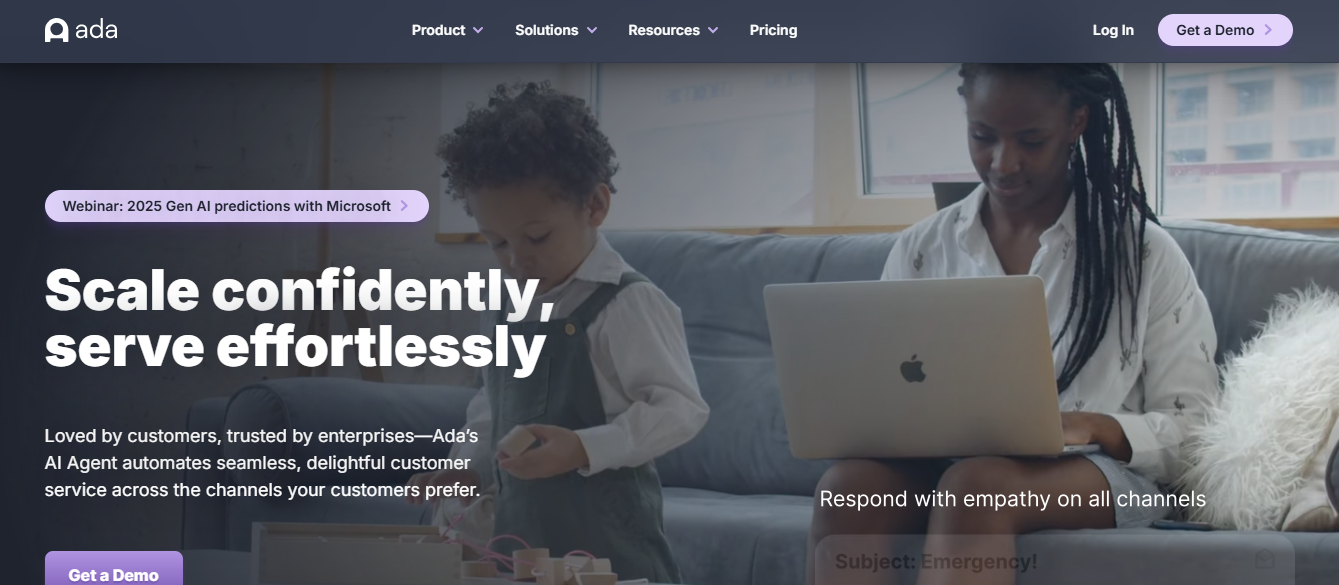
Ada is an advanced AI-powered customer service automation platform designed to improve customer experiences and reduce operational costs. With its voice AI agent, Ada eliminates the need for outdated IVR systems and enables businesses to resolve up to 26% of interactions without human intervention. Organizations can quickly onboard Ada’s no-code AI agent, ensuring seamless support across voice and messaging channels. Businesses like Amuse have achieved remarkable results, such as a 30% automated resolution rate in just 12 weeks. By integrating Ada, companies can deliver consistent, extraordinary customer service while cutting costs and streamlining operations.
Carevoice.ai
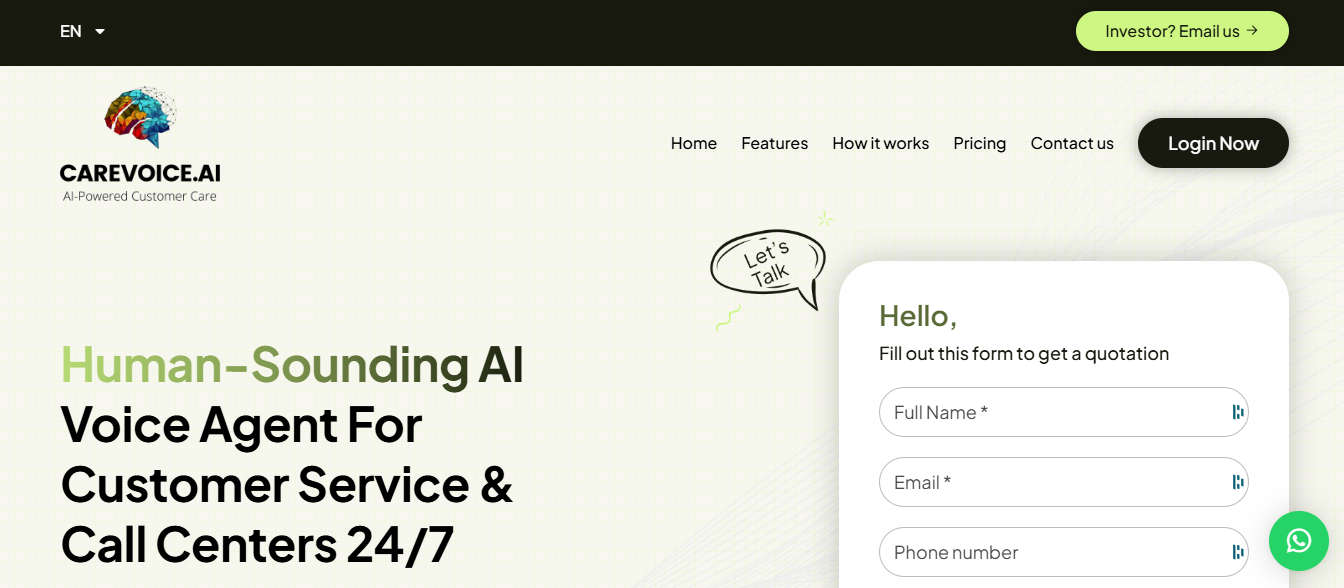
Carevoice.ai specializes in delivering a human-like AI voice agent for 24/7 customer service and call center support. Designed to cut service costs by up to 50%, the platform uses uploaded Q&A scripts and training material to accurately address customer inquiries, regardless of phrasing. With zero hold time and the ability to handle unlimited simultaneous calls, Carevoice.ai ensures efficient and accurate responses. Its robust technology guarantees that customers receive fast, high-quality service anytime, enhancing satisfaction and reducing operational burdens.
Synthflow.ai
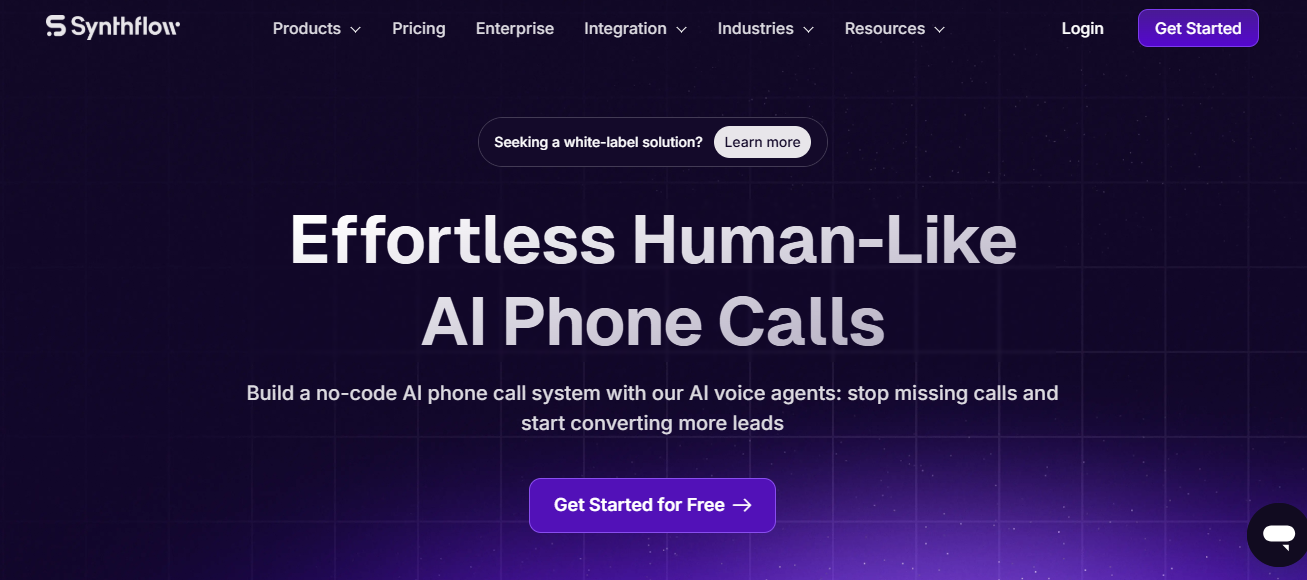
Synthflow AI empowers businesses with 24/7 AI voice agents designed for real-time customer interactions. The platform handles both inbound and outbound calls, offering services such as lead qualification, appointment scheduling, and customer support. Synthflow’s customizable AI agents come with no-code tools and flexible deployment options, ensuring seamless integration into existing systems. Businesses can stop missing calls and start converting leads effortlessly with its scalable technology, all while benefiting from human-like AI communication that streamlines engagement and operational efficiency.
Bland AI

Bland AI provides human-like conversational capabilities for automated phone calls, transforming enterprise communication with advanced AI guardrails to prevent hallucinations and deliver intelligent responses. The platform excels at automating both inbound and outbound calls, seamlessly transitioning to humans when needed, booking meetings, sending AI texts, or updating CRMs. With Bland AI, businesses can create smooth, intuitive workflows that elevate customer experience while maximizing operational efficiency.
Cognigy
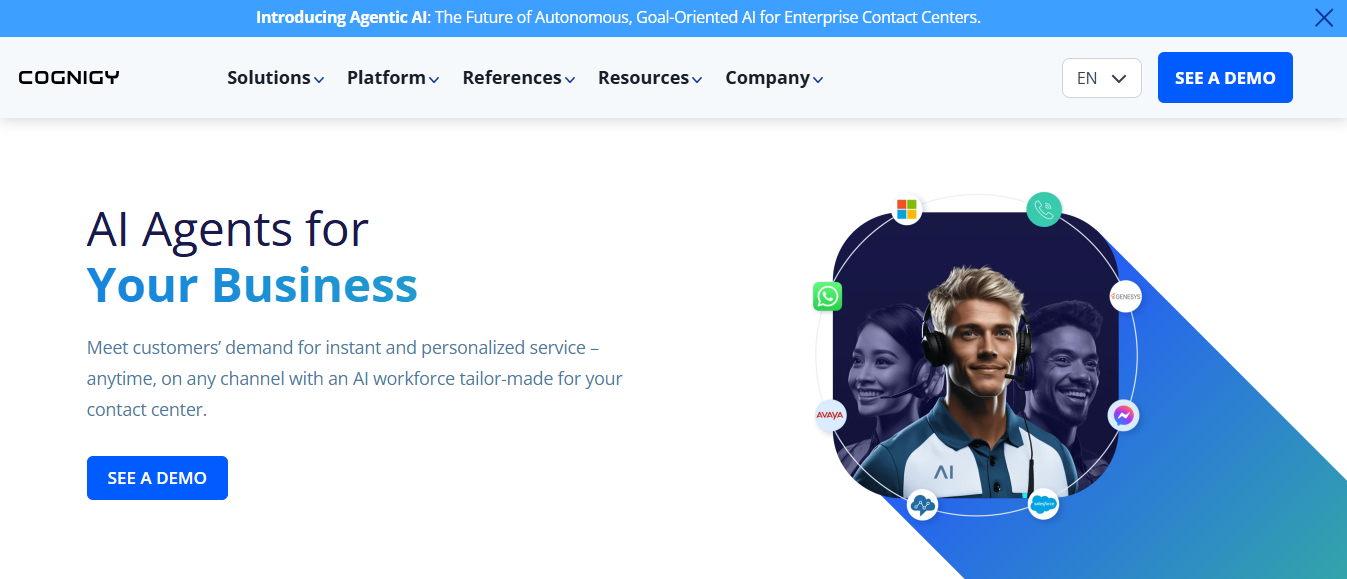
Cognigy voice AI agents deliver empathetic, intelligent, and scalable phone conversations for 24/7 customer support. Leveraging generative and conversational AI, Cognigy’s agents understand customer intent, context, and sentiment to offer tailored, personalized service in over 100 languages. Perfect for contact centers, Cognigy’s digital workforce bridges service gaps with instant, reliable, and effective communication across phone and chat channels, enabling businesses to meet high customer expectations effortlessly.
Air.ai
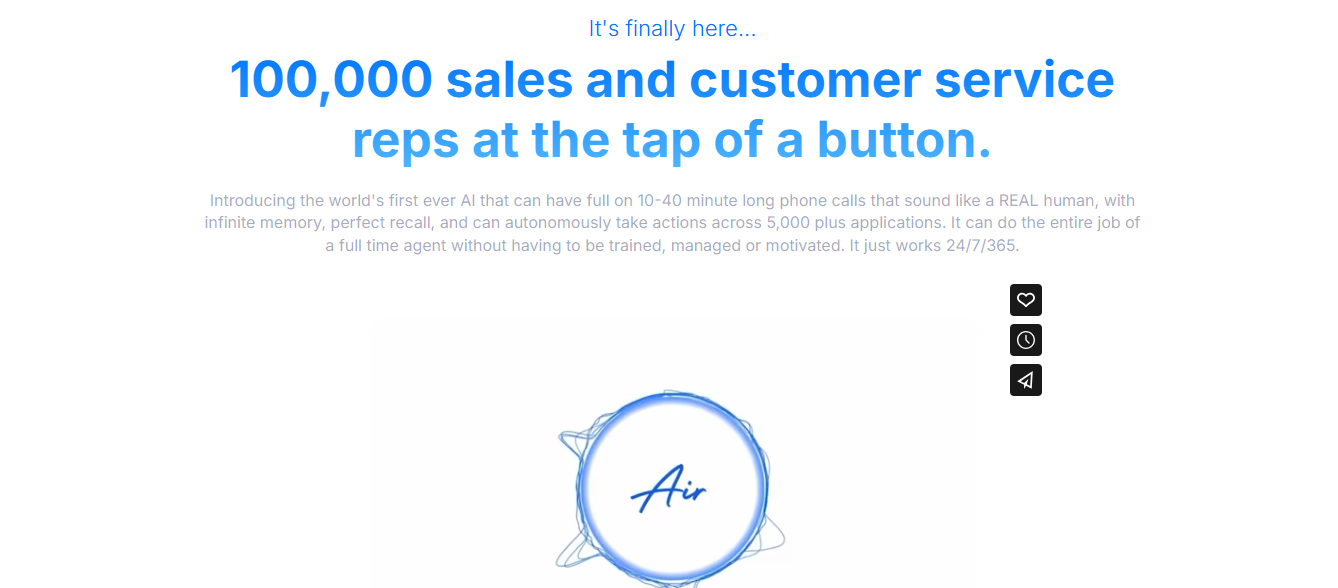
Air.ai introduces a groundbreaking AI capable of conducting 10-40 minute human-like phone calls with infinite memory and perfect recall. This AI voice agent autonomously performs tasks across 5,000+ applications, eliminating the need for training, management, or motivation. Operating 24/7/365, Air.ai handles the full scope of an agent’s job, ensuring seamless and realistic interactions that elevate customer experience and drive efficiency.
Vapi.ai

Vapi.ai offers developers a platform to build, test, and deploy voice agents in minutes, catering to a wide range of applications including customer support, telehealth, outbound sales, and transportation logistics. Its flexibility allows users to design agents for diverse use cases, providing businesses with an agile and fast solution for creating robust AI voice interactions.
Thought.ly
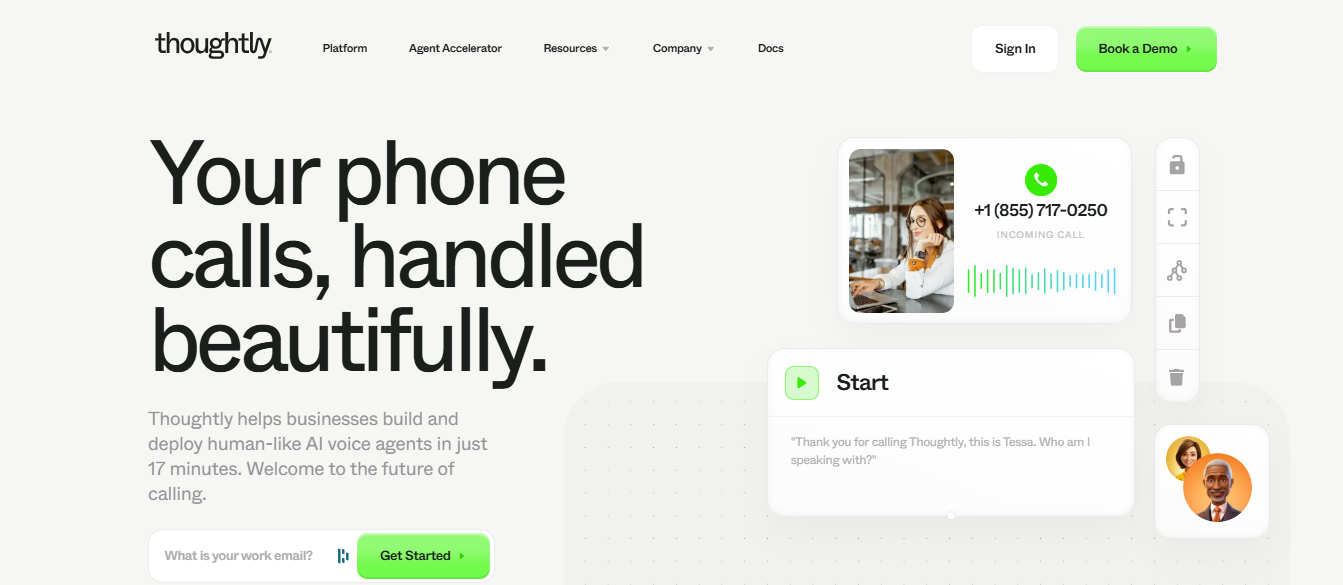
Thought.ly streamlines the creation and deployment of human-like AI voice agents, enabling businesses to set up agents in as little as 17 minutes. Ideal for customer service, sales, and marketing, Thoughtly agents handle inbound and outbound calls with finesse. Businesses can either self-build their agents or receive expert assistance to design solutions tailored to their specific needs, revolutionizing the way calls are managed.
Retell AI
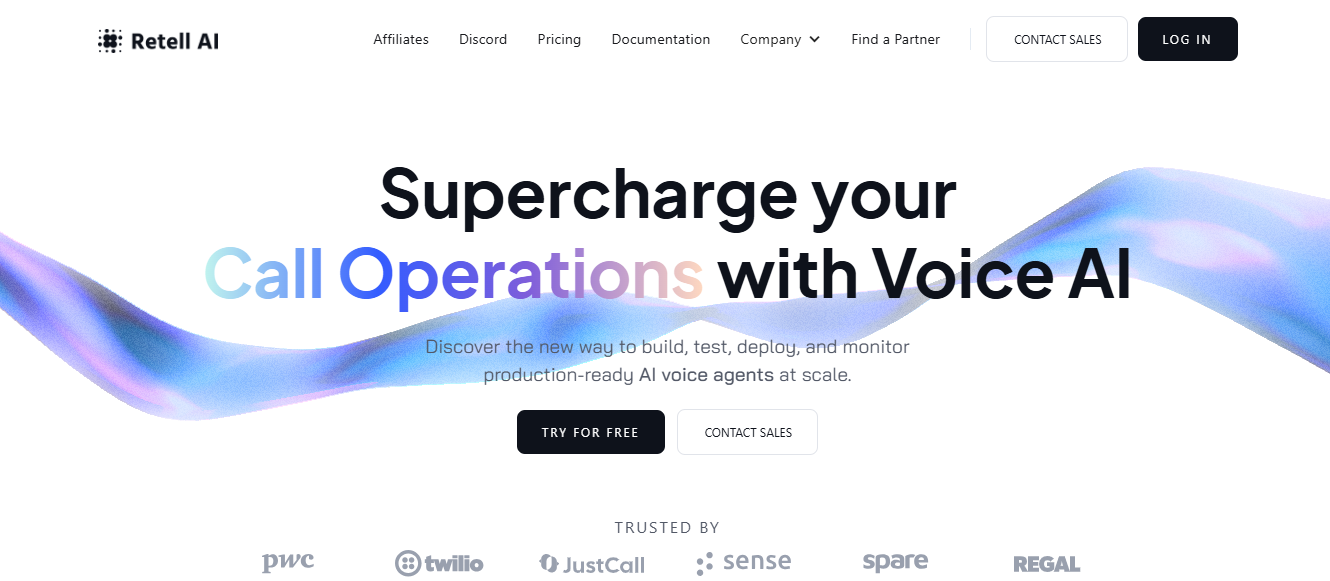
Retell AI delivers versatile voice agents tailored to various use cases such as lead generation, debt collection, surveys, and customer service. Its robust AI platform allows businesses to build, test, and deploy complex workflows in minutes. With the ability to operate across phone calls, web calls, and other channels, Retell AI offers an all-in-one solution for automating voice communication and enhancing operational efficiency.
Create Your Own AI Agents with Speechify TTS API
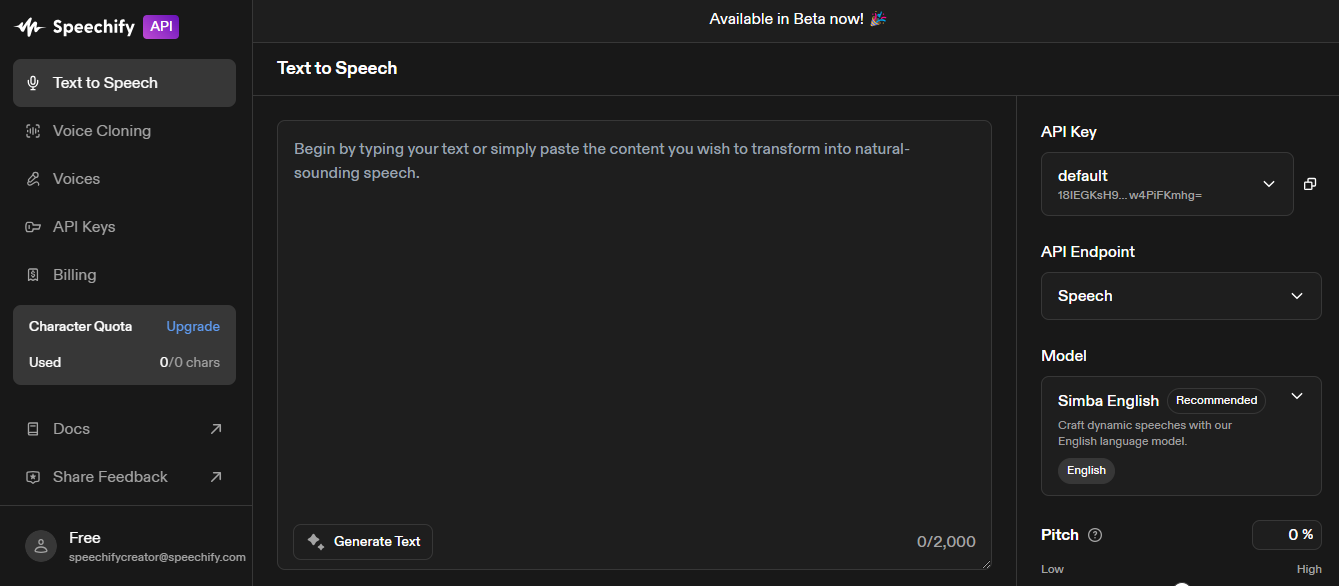
You don’t have to settle for generic AI voice agent templates provided by other companies. With Speechify’s TTS API and voice cloning capabilities, you can create your own fully customized AI voice agents tailored to your specific needs. Whether you want a unique voice that represents your brand identity or an AI agent with a distinct personality, Speechify’s API empowers you to design and fine-tune every aspect. From tone and pitch to pacing and emotional expression, you have full control to craft AI voice agents that resonate with your audience and deliver a personalized, impactful experience.
FAQ
How are AI voice agents different than chatbots like ChatGPT?
AI voice agents, unlike chatbots like OpenAI's ChatGPT, interact with users through natural-sounding spoken language rather than text-based communication, providing a more auditory and conversational experience.
How do AI voice agents for call centers work?
AI voice agents for call centers work by using a phone number to interact with customers through speech, leveraging NLP to understand queries and TTS to deliver natural, real-time responses.
What are the use cases of AI voice APIs?
AI voice APIs, such as Speechify’s TTS API, are used in diverse applications such as creating AI agents for customer support, generating natural-sounding narrations for podcasts and audiobooks, and enhancing accessibility tools.
How can AI voice agents improve customer service experiences?
AI voice agents can improve customer service experiences by providing fast, accurate, and personalized responses 24/7, reducing wait times, and ensuring consistent service quality.

Cliff Weitzman
Cliff Weitzman is a dyslexia advocate and the CEO and founder of Speechify, the #1 text-to-speech app in the world, totaling over 100,000 5-star reviews and ranking first place in the App Store for the News & Magazines category. In 2017, Weitzman was named to the Forbes 30 under 30 list for his work making the internet more accessible to people with learning disabilities. Cliff Weitzman has been featured in EdSurge, Inc., PC Mag, Entrepreneur, Mashable, among other leading outlets.
 Previous
Previous